Wordmith Wednesday: The Cry Above The Trees

By: Iana Lis Natalino (Substack/Tumblr)
The sun dries the forest’s rotten leaves. A shadowy creature drinks from the creek with a certain apathy. The scent of decay wraps itself around the roots, comforting the ones who come here seeking solace. I walk on the moist ground. Something shifts, as if I’m being followed by a single cry that floats above me. It’s weightless but watchful. It doesn’t speak. It crashes into the trees, dropping leaves and branches in soft fits. I don’t look up. I fear it, though, a nameless presence dares not to hurt.
It reminds me of my betta fish, the one who was haunted by its own kind. Bettas are solitary, so I didn’t bring another. But he swam, and swam. I could smell his fear. No matter how much I cleaned the tank, a dark moss always grew where he slept. Do fishes dream? Was he still haunted even in his peaceful float? If I dreamt of water, he’d always follow me.
I moved the tank once, to a spot with more sunlight. I think it was before the haunting.
Now, I walk this forest, unsure if I’m acting or only drifting. Moss clings to the trees like unspoken guilt. I wonder if every haunted being ends up buried here. If something greater sleeps beneath this blanket. I fear I walk in its ribs, disturbing its breath. I don’t remember knocking. I don’t remember asking to enter.
When a gust of breeze caresses me, I see a red cloth fluttering, tied to a branch ahead. Beneath it, a candle. I imagine them standing here, alone like me. Maybe they carried a bundle in linen, something carefully chosen: the ashes of a loved one, seeds from a garden long gone, an unsent letter. Things you don’t bury, but can’t bring yourself to keep.
When they knelt at the moss, I don’t think it was to pray, at least, not in the way people usually mean. It seemed more like listening. Like someone who no longer needed answers, only space to speak the unspeakable.
I think what they gave to the forest was a name. One they couldn’t say aloud anywhere else. A name bound to pain or shame or loss, spoken not in words but in breath and presence. They asked for nothing in return. And yet, I believe the forest gave them something anyway — a quiet night, a dreamless sleep, or perhaps just the sense that, for once, they weren’t being watched by grief.
I kneel too. Pressing my hand into the moss, damp and forgiving, I whisper, “I’m sorry.” I don’t know exactly what I’m apologizing for: trespassing, forgetting, fearing what I didn’t understand. Maybe all of it.
There’s no reply. The forest remains still. But the cry above me, sharp and ever-present, slows. It softens at the edges, no longer slicing through the branches, no longer demanding to be heard. It hovers instead, quieter. Patient. As if it has been waiting not to be believed in, but simply to be seen. I had mistaken it for something haunting because I had forgotten what waiting felt like.
I reach into my coat pocket and pull out a small stone I’ve been carrying for no reason I could name. I place it near the candle that melted and hardened across the green fuzziness.
The moss doesn’t shift, and the trees don’t speak. But the cry lingers close now. Not above, but beside. Maybe too close, whispering something I can’t quite understand. It still unsettles me, but not in the same way. There’s no danger, only the unfamiliar echo of being witnessed.
I rise and look toward the hill. There’s a clearing beyond it. I can smell something sweeter carried on the wind, smoke perhaps. Or the memory of fire. Something warm, not burning. Something tended. This time, I will walk toward it.
And I will leave a trail behind me: a stone laid in careful hands, a breath shared with the moss, a single word whispered to the air, so the next haunted soul who walks this path knows they’re not walking it alone.
Iana Lis Natalino is an aspiring writer and wildlife vet who loves nature, words, and all things strange and stormy. Introspective but endlessly curious, she is probably wondering how to bring more poetry into science — and writing quiet reflections on memory, perception, and the surreal edges of everyday life. Find her on Tumblr and Substack at anthropoetics.
Thank you for reading! Ember & Ink is a reader-supported publication.
Please consider supporting us on Ko-Fi.
We are also available for marketing, design, and voice work services.
